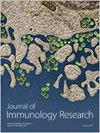RND3 通过活化巨噬细胞中的 NOTCH 信号增强前炎症激活作用
IF 3.5
3区 医学
Q2 IMMUNOLOGY
引用次数: 0
摘要
巨噬细胞的活化是一个复杂的过程,其中包含多种控制因素,一方面要确保对病原体的侵袭做出适当的反应,另一方面要避免炎症活动过度而造成组织损伤。在这项研究中,我们发现了一种小 GTP 结合蛋白 RND3,它是导致巨噬细胞活化的复杂信号传导过程中的一个新元素。我们发现,在通过 Toll 受体激活的巨噬细胞中,RND3 的表达被瞬时诱导,并被 IFN-γ 强化。我们还证明,RND3 可通过促进 NOTCH1 的表达及其核活性来增加巨噬细胞中的 NOTCH 信号;然而,RND3 的表达似乎会受到 NOTCH 信号的抑制,从而形成一个负调节反馈回路。此外,RND3 蛋白水平的增加似乎会增强 NFκB 和 STAT1 的转录活性,导致 Tnf-α、Irf-1 或 Cxcl-10 等促炎基因的表达增加。总之,我们的研究结果表明,RND3 似乎是一种新的调控因子,它可以控制巨噬细胞的活化,并能通过 NOTCH 对炎症反应进行微调。本文章由计算机程序翻译,如有差异,请以英文原文为准。
RND3 Potentiates Proinflammatory Activation through NOTCH Signaling in Activated Macrophages
Macrophage activation is a complex process with multiple control elements that ensures an adequate response to the aggressor pathogens and, on the other hand, avoids an excess of inflammatory activity that could cause tissue damage. In this study, we have identified RND3, a small GTP-binding protein, as a new element in the complex signaling process that leads to macrophage activation. We show that RND3 expression is transiently induced in macrophages activated through Toll receptors and potentiated by IFN-γ. We also demonstrate that RND3 increases NOTCH signaling in macrophages by favoring NOTCH1 expression and its nuclear activity; however, Rnd3 expression seems to be inhibited by NOTCH signaling, setting up a negative regulatory feedback loop. Moreover, increased RND3 protein levels seem to potentiate NFκB and STAT1 transcriptional activity resulting in increased expression of proinflammatory genes, such as Tnf-α, Irf-1, or Cxcl-10. Altogether, our results indicate that RND3 seems to be a new regulatory element which could control the activation of macrophages, able to fine tune the inflammatory response through NOTCH.
求助全文
通过发布文献求助,成功后即可免费获取论文全文。
去求助
来源期刊

Journal of Immunology Research
IMMUNOLOGY-
CiteScore
6.90
自引率
2.40%
发文量
423
审稿时长
15 weeks
期刊介绍:
Journal of Immunology Research is a peer-reviewed, Open Access journal that provides a platform for scientists and clinicians working in different areas of immunology and therapy. The journal publishes research articles, review articles, as well as clinical studies related to classical immunology, molecular immunology, clinical immunology, cancer immunology, transplantation immunology, immune pathology, immunodeficiency, autoimmune diseases, immune disorders, and immunotherapy.
 求助内容:
求助内容: 应助结果提醒方式:
应助结果提醒方式:


